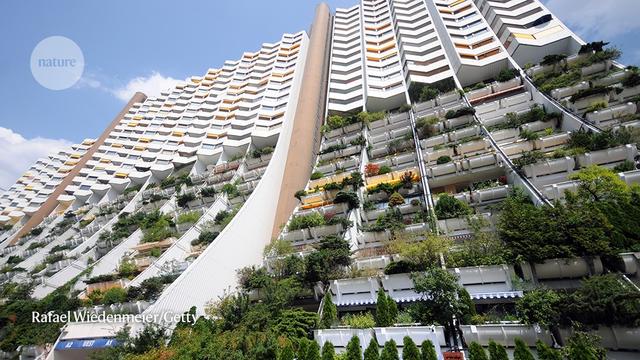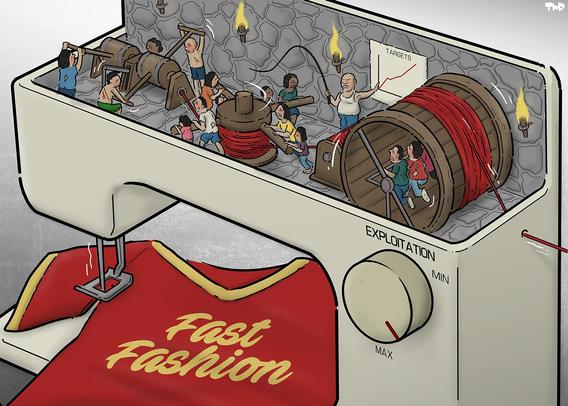https://www.europesays.com/1959746/ The Dark Side Of Fast Fashion Business Models #america #business #BusinessModels #ClimateChange #emissions #EnvironmentalImpact #FastFashion #Microplastics #pollution #shein #UnitedStates #UnitedStatesOfAmerica #US #USA #waste #Zara
Recent searches
Search options
#fastfashion
@tansy Thank you for the link!
Fast fashion. Cartoon for Trouw: https://www.trouw.nl/cartoons/tjeerd-royaards~bcb45712/
#Degrowth can work — here’s how science can help
Wealthy countries can create prosperity while using less materials and energy if they abandon #EconomicGrowth as an objective.
By Jason Hickel, Giorgos Kallis, Tim Jackson, Daniel W. O’Neill, Juliet B. Schor, Julia K. Steinberger, Peter A. Victor & Diana Ürge-Vorsatz, 12 December 2022
Excerpt: "The global economy is structured around growth — the idea that firms, industries and nations must increase production every year, regardless of whether it is needed. This dynamic is driving climate change and ecological breakdown. High-income economies, and the corporations and wealthy classes that dominate them, are mainly responsible for this problem and consume energy and materials at unsustainable rates.
"Yet many industrialized countries are now struggling to grow their economies, given economic convulsions caused by the COVID-19 pandemic, Russia’s invasion of Ukraine, resource scarcities and stagnating productivity improvements. Governments face a difficult situation. Their attempts to stimulate growth clash with objectives to improve human well-being and reduce environmental damage.
"GDP is getting a makeover — what it means for economies, health and the planet
"Researchers in ecological economics call for a different approach — degrowth. Wealthy economies should abandon growth of gross domestic product (#GDP) as a goal, scale down destructive and unnecessary forms of #production to reduce energy and material use, and focus economic activity around securing human needs and well-being. This approach, which has gained traction in recent years, can enable rapid #decarbonization and stop ecological breakdown while improving social outcomes. It frees up energy and materials for low- and middle-income countries in which growth might still be needed for development. Degrowth is a purposeful strategy to stabilize economies and achieve social and ecological goals, unlike recession, which is chaotic and socially destabilizing and occurs when growth-dependent economies fail to grow.
"Reports this year by the Intergovernmental Panel on Climate Change (#IPCC) and the Intergovernmental Science-Policy Platform on #Biodiversity and #Ecosystem Services (#IPBES) suggest that degrowth policies should be considered in the fight against #ClimateBreakdown and #biodiversity loss, respectively. Policies to support such a strategy include the following.
"Reduce less-necessary production. This means scaling down destructive sectors such as #FossilFuels, mass-produced meat and dairy, #FastFashion, #advertising, #cars and aviation, including #PrivateJets. At the same time, there is a need to end the #PlannedObsolescence of products, lengthen their lifespans and reduce the purchasing power of the #rich.
"Improve #PublicServices. It is necessary to ensure universal access to high-quality #HealthCare, #Education, #Housing, transportation, Internet, #RenewableEnergy and nutritious food. #UniversalPublicServices can deliver strong social outcomes without high levels of resource use.
"Introduce a green jobs guarantee. This would train and mobilize labour around urgent social and ecological objectives, such as installing renewables, insulating buildings, regenerating #ecosystems and improving social care. A programme of this type would end unemployment and ensure a just transition out of jobs for workers in declining industries or 'sunset sectors', such as those contingent on fossil fuels. It could be paired with a #UniversalIncome policy.
"Reduce working time. This could be achieved by lowering the retirement age, encouraging part-time working or adopting a four-day working week [and hybrid or remote work]. These measures would lower #CarbonEmissions and free people to engage in care and other welfare-improving activities. They would also stabilize employment as less-necessary production declines.
"Enable #sustainable development. This requires cancelling unfair and unpayable debts of low- and middle-income countries, curbing unequal exchange in international trade and creating conditions for productive capacity to be reoriented towards achieving social objectives.
"Some countries, regions and cities have already introduced elements of these policies. Many European nations guarantee free health care and education; Vienna and Singapore are renowned for high-quality public housing; and nearly 100 cities worldwide offer free public transport. Job guarantee schemes have been used by many nations in the past, and experiments with basic incomes and shorter working hours are under way in Finland, Sweden and New Zealand.
"But implementing a more comprehensive strategy of degrowth — in a safe and just way — faces five key research challenges, as we outline here."
Read more:
https://www.nature.com/articles/d41586-022-04412-x
Archived version:
https://archive.ph/AtJ87
#FourDayWorkweek #RemoteWork #HybridWork #CircularEconomy #CapitalismKills #RightToRepair #ProtectMotherEarth #CorporateColonialism #BuyLess #BuyNothing #LibraryOfThings #SolarPunkSunday

76 kilogram per jaar, zo veel textiel koopt een gemiddeld Europees gezin met vier personen. Het gaat dan om kleren, schoenen en huishoudelijk textiel, zoals handdoeken of lakens. Dat komt overeen met maar liefst 19 kilogram per persoon, dat wil zeggen dat we elk jaar een zware reiskoffer aan nieuwe spullen kopen.
#kledij #fastfashion #milieu #consumentisme #vervuiling #tweedehands
3. It gives praise to entities that don't deserve it just because they are "European". Point in case: the certainly well-intentioned @goeuropean project, which recommends (among many very ethical companies) some really terrible "European alternatives", e.g.:
* #Volkswagen, #Audi, that built cheat software into their cars to make them look cleaner
* #Inditex, #Zalando, some of the worst #fastfashion polluters
* #RedBull, the drinks company owned by an Austrian far-right #billionaire
Est-ce que tu penses qu'il y a moyen de faire des fringues plus qualitatives, made in France, plus éco-responsables et plus durables, mais pour moins cher ?
"Non je ne crois pas.
C'est ça qui est terrible, si tu veux faire baisser le prix des vêtements, derrière y a un truc que tu ne paies/respecte pas. Que ce soit le travail des gens, ou la nature.
C'est ce qui ne va pas dans la réflexion actuelle : on veut absolument faire baisser le prix des objets. C'est pas ça qu'il faut faire. Il faut faire augmenter le niveau de vie des gens.
Faut qu'ils soient mieux payés, ça veut dire qu'il faut que l'école coûte moins cher, qu'il y ait plus de services publics qui soient plus performants, ...
C'est cette approche-là qu'il faut avoir."
(Et ça vaut pour tous les objets de notre quotidien)
Fast fashion brands flood the market with cheap, trendy clothing, creating enormous environmental and social harm. Despite their attempts at greenwashing, their business model is fundamentally incompatible with true sustainability.
Here are four key reasons why fast fashion will never be green and why we should slow down the fast fashion industry!
https://www.greenpeace.org/aotearoa/story/fast-fashion-4-reasons-will-never-be-green/
Esta tarde me he puesto un #documental recomendado por @sagilca que obligaría a ver no sólo a mi alumnado, sino a todas aquellas personas que compran ropa de primera mano a grandes empresas.
La esclavitud de esos talleres clandestinos gracias a los cuales se enriquecen personajes como Amancio no está sólo en China o en Bangladesh, también aquí cerca, en #Elche.
Se llama #RopaSucia y lo tenéis aquí:
https://ropasuciadocumental.org/
#FastFashion is mostly plastic clothes,
and plastics are what the fossil fuel industry is counting on for their "growth" in the next decade.
So they will tell you it can be "recycled"
-- but that's a lie, most of the plastic clothes will turn into acrid smoke or microplastics.
So: Love your clothes.
Don't buy plastic clothes.
Buy fewer clothes.
Buy natural-fiber clothes.
Buy clothes that last a long time.
Re-use, Repair, Repurpose.
But first of all: Refuse to buy.
"EL PAÍS followed the path of 15 geolocated garments for months and over thousands of kilometers to gauge the environmental and social costs of the mass consumption of #FastFashion. Dubbed in Africa as ‘dead white man’s clothing,’ it pollutes countries in the Global South, feeds opaque commercial networks and leaves a long #CarbonFootprint in its wake."
What fast fashion leads to
The spanish paper and online portal EL PAÍS just published a revealing investigation. They endowed used but still good clothes with hidden geolocation tags and deposited the clothes in 15 used clothes bins across Spain. Then they tracked the journeys of the different pieces. It's a long and abysmal story.
Good tips for spotting durable clothes and avoiding #FastFashion.
Essentially comes down to
- natural materials and not natural + synthetic blends
- judge by smoothness, fluff, elasticity, strength, drape and density
- thoughtful construction, such as seams are better than stiches
All of this points to saying no to online shopping, since a lot of the above cannot be inspected from an online catalgoue.
A new book for friends of #archeology and #deepHistory: Discarded. Imagine a future when Earth creatures could find the #technofossils of our time. What will they find? What remains the most of our "civilisation"? An exciting change of perspective on our more long-lasting ‘achievements’. https://www.theguardian.com/science/2025/feb/22/technofossils-how-plastic-bags-and-chicken-bones-will-become-our-eternal-legacy
Chez Emmaüs, les entrepôts débordent. Le marché de l'occasion n'arrive plus à absorber la surproduction de vêtements, dont la qualité est en chute libre.
90% des vêtements collectés en France sont exportés, mais l'arrivée de friperies chinoises peu chères qui exportent elles aussi ferme tous les débouchés.
La preuve qu'il faut réduire la production à la source, pas compter sur la seconde main pour tout résoudre. https://www.lemonde.fr/planete/article/2025/01/27/la-filiere-de-collecte-des-textiles-saturee-sous-l-effet-de-la-fast-fashion_6518535_3244.html?random=328227775
What really happens to your used clothing? How does overconsumption affect mental health? And which touring musician is most transparent about production of their merch? @TeenVogue has created this @Flipboard Storyboard exploring the seamier side of the fashion industry. Tell us: How do you manage the environmental impact of your clothing choices (choose as many as you like).
https://flipboard.com/@teenvogue/the-last-stop-kg9fm0ip0ifsfgsj
Bernadette my beloved, once again providing visual examples, multiple good tangents and a good dash of both looks and passion, in answering some of the questions around: "But how the heck do I know if a garment is trash?"
Trash causes climate change. Here's how some are helping:
Tearing down buildings creates more than 600 million tons of trash in the US every year, but de-constructing buildings can help change that...
Almost all the clothes we wear wind up in a landfill, but companies are now working to give new life to old textiles...
A business scavenging and reselling goods found dumpster diving...
https://www.npr.org/2026/01/01/1213561021/zz-hereandnow-bonusdraft
What happens to your used donated clothes? Do you want to know?
#FastFashion #Sustainability #Consumerism
https://www.teenvogue.com/story/what-really-happens-to-your-used-clothing





